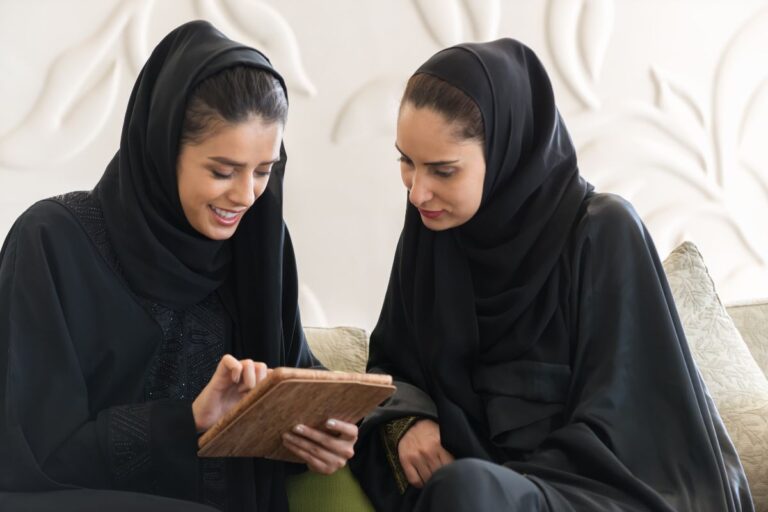The UAE’s economic story has always been one of forward-thinking leadership. Long before skyscrapers rose over our shores, the nation’s lifeblood was the pearl trade, an industry built on resilience, skill, and global connection.
Pearl diving demanded trust and the courage to navigate uncertainty – qualities that define great leaders today. From those early trading networks to the discovery of oil, and now to a diversified, knowledge-based economy, reinvention has been our constant.
During two decades at Mubadala, I witnessed this transformation firsthand. Visionary institutions like Mubadala were created as catalysts for progress, investing globally and locally to future-proof the nation’s prosperity.
Today, disruption by design remains essential. A volatile world shaped by climate risk, rapid technological change, and shifting geopolitics demands leadership that is both innovative and inclusive – and Emirati women are already at the forefront.
Across classrooms, labs and boardroom, Emirati women are powering the UAE’s economy. They comprise nearly half of the UAE’s workforce, and their presence in leadership roles is steadily rising across key sectors.
The results are visible on the global stage: in the United Nations Development Program’s latest Gender Inequality Index, the UAE ranked 7th globally and 1st regionally, up from 49th just a decade ago.
Entrepreneurship tells an equally compelling story. In the first half of 2024 alone, Emirati businesswomen launched nearly one in five new businesses in the UAE.
During the pandemic, women-led companies in the UAE grew an estimated 68 per cent. Diverse leadership teams are linked with stronger innovation performance and better financial outcomes.
Firms with more women in STEM leadership generate 35 per cent higher revenue from innovation on average. We see these benefits first-hand, they go beyond the numbers. When women are at the table, strategy debates are richer, investment horizons longer, and outcomes more sustainable.
Female executives consistently champion priorities such as investing in R&D, skills development, prioritising long term growth and social responsibility – creating conditions where new ideas can flourish.
None of this progress is accidental. The UAE has deliberately embedded gender parity into its national agenda through purposeful policies and institutional support. The National Policy for the Empowerment of Emirati Women 2031 aims to ensure women’s full and equitable participation across sectors while the Gender Balance Council works to close leadership gaps and guarantee women a seat at every decision-making table.
Targeted measures — from mentorship and leadership training to funding and incubators — reflect a consistent message: women belong in every sector and at every decision-making table.
At Mubadala, this progress is visible internally. Women now hold about 20 per cent of executive-level positions — a result of deliberate efforts to nurture and promote talent.
What makes this especially meaningful is that most of these leaders are homegrown, having built their careers and capabilities within the organisation. Today, one in every four investment managers is a woman, shaping capital allocation decisions that influence industries across the globe.
This momentum extends into our wider portfolio. Across our UAE-based companies, women represent on average a third of the total workforce and about 20 per cent of senior leadership roles.
We are committed to continuing to grow these numbers. show that gender balance is not only possible but achievable across diverse sectors when it is made a strategic priority. While we are proud of this progress, we recognize that there is still more to do and remain committed to ensuring women representation at every level across Mubadala and our portfolio.
And yet, we know the journey is unfinished. Women remain underrepresented such as in senior executive roles, advanced research fields and capital-intensive industries. If the UAE is to lead the world in defining the next economic model, we must continue to place women at the center of three priorities: capital, capability and convening.
Women-led ventures still face barriers in accessing financing. Expanding flexible financing and procurement pathways will allow women to scale businesses in transformational sectors such as climate tech, health tech and industrial digitalization.
We also need to increase capability by accelerating women’s access to frontier skills – AI, data science, energy systems – through scholarships, apprenticeships and mid-career upskilling. Without deliberate action, tomorrow’s growth sectors risk replicating yesterday’s inequities. Representation at the decision-making level is what ensures that growth strategies reflect the full spectrum of talent and innovation.
And finally, we need to put more women at the center of decision-making – on boards, investment committees and national councils – where sectoral bets are made.
Emirati Women’s Day is not only a moment of celebration; it is a call to action. Our history shows that bold, deliberate action can redefine what is possible. The next wave of economic disruption will be no different.
But the future will not be shaped by technology or markets alone. It will be defined by who leads, who has access, and whose voices guide the decisions. If women remain at the center of our economic journey, the UAE will not merely adapt to global disruption—it will define the terms of it. If we continue to invest in women’s capital, capability, and convening power, the UAE’s story of reinvention will remain unbroken.

